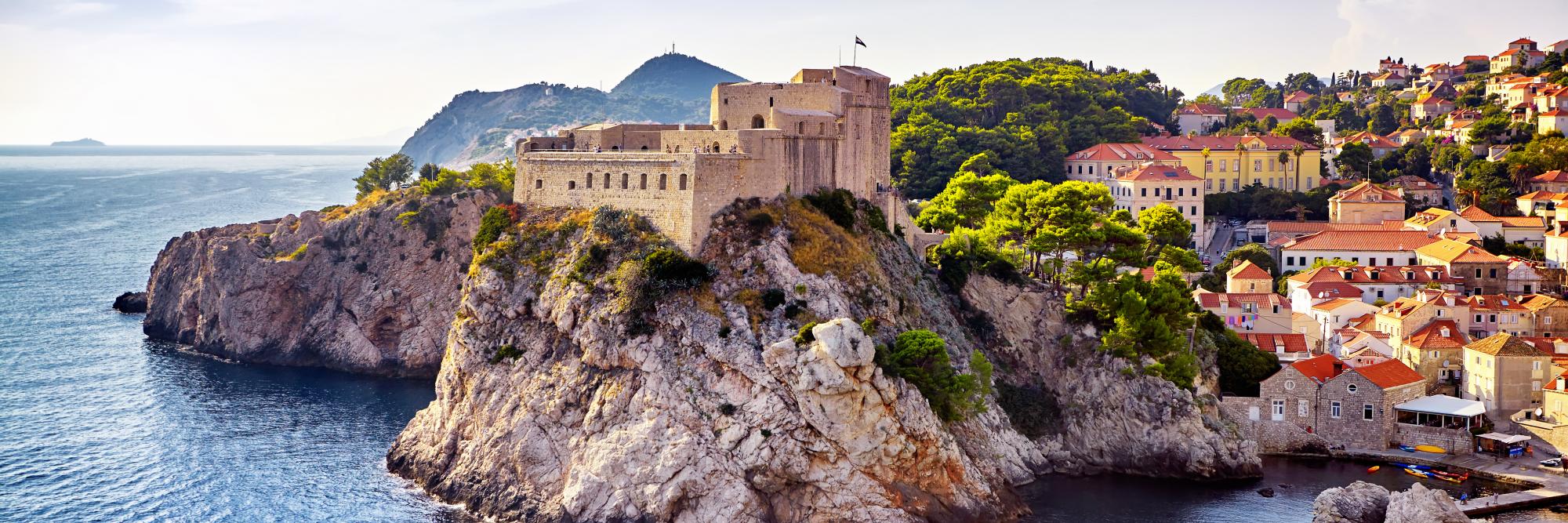Sara is an American expat from Dallas, Texas who works as a freelancer in Croatia. She speaks about her experiences of the Croatian culture and lifestyle and highlights some of the challenges which expats might face when adapting to life in this European country. Follow her adventures on her blog, Expat in Croatia, or her X.
About Sara 
Q: Where are you originally from?
A: Dallas, Texas
Q: Where are you currently living?
A: Split, Croatia
Q: When did you move here?
A: 2012
Q: Is this your first expat experience?
A: No, I lived in Amsterdam for one year.
Q: Did you move here alone or with a spouse/family?
A: I moved here alone.
Q: Why did you move; what do you do?
A: I wanted to return to Europe and also wanted to start my own business. I had visited Croatia and loved it. With the low cost of living, it seemed like the best place to test the waters of freelancing. If the business failed or I couldn’t get residence, it would be just a long vacation. Luckily, it worked out.
Living in Split
Q: What do you enjoy most about Split? How would you rate the quality of life compared to your home country?
A: Split is a village. I love how social it is. I will always run into people I know when out and about. If you want to grab a coffee, you can call somebody up and meet them in 20 minutes. Social life is of high importance here.
Q: Any negative experiences? What do you miss most about home?
A: I have a very romantic view of Croatia, compared to most. The only big negative for me is the anti-entrepreneur culture and laws. Taxes, regulations, permits, etc. for businesses are all super oppressive and they are only getting worse.
I miss my family and friends, but mainly brisket.
Q: What are the biggest adjustments you had to make when settling into expat life? Did you experience any particular elements of culture shock?
A: I recently came across an old post that I wrote shortly after moving here. It reminded me of how shocked I was at how kind and generous people were. It wasn’t that I thought they wouldn’t be, it’s that it’s not normal to be that generous with strangers back in the United States. It was startling in the best way.
Q: What’s the cost of living compared to the USA? Is there anything particularly expensive or particularly cheap in Croatia?
A: The cost of living is drastically lower here, but that is only when compared to my home country. If you work and live in Croatia, the cost of living is considered expensive.
Produce, when purchased at the farmer’s market (called a “pazar”), is quite inexpensive and most likely grown right around the corner.
Q: How would you rate the public transport in Split? What is your most memorable experience of using the transport system?
A: Ha. Good question. We have buses only in Split. They can be hit and miss. Sometimes they are brand new, sometimes they are 60 years old and rattle as if they may fall apart at any moment, and sometimes they never show up.
After being here maybe two years, I remember losing it about the buses not showing up to a Croatian friend of mine. I could not understand how buses could just not come and why people weren’t revolting as a result. He said, “Yeah, sometimes they just don’t come. We know that is a possibility and have accepted it. It’s not a big deal.” And ever since, I’ve looked at it the same way.
Q: How would you rate the healthcare in Split? Have you had any particularly good/bad experiences with regards to doctors and hospitals? Are there any hospitals you would recommend?
A: This is a hard question, because I don’t want to characterise a system based on my experiences alone. Many have had good experiences and many have had bad experiences.
For me personally, I’m pleased overall. Healthcare premiums are reasonable and cover almost everything. Preventative healthcare is great. I’ve never had any serious health problems so cannot speak to what a hospital is like as a patient. I have been in a hospital visiting a friend and it is pretty bare bones. That being said, he received great care.
I did have a doctor give me an ear infection due to pure incompetence. I also had a doctor judge me for not having children. He actually said to me, “There is still time.” Despite these bad spots, I’ve had predominantly positive experiences. I definitely prefer healthcare in Croatia to that in the United States. I’m not at risk of losing my house or going bankrupt here to get care.
Q: What are the biggest safety issues facing expats living in Croatia? Are there any areas expats should avoid?
A: Split is a super safe city. My primary safety concern is getting hit by a car when in a crosswalk. I’ve had more than a few near misses. Definitely pay attention to all cars in your vicinity when crossing the street. There also is a lot of drunk driving, so it is best to be very careful at night.
Q: How do you rate the standard of housing in Split? What different options are available for expats?
A: The standard of housing is great and affordable for expats. The problem is that there is very little of it. Croatians control most of the property. If they are not living in the apartment themselves, it’s likely being rented out as a vacation rental instead of a long term rental.
Detached houses are not common in Split, so most people live in apartments. In the city centre, they are expensive and small. If you venture out of the city centre you’ll get a lot more for your money.
Q: Any areas or suburbs you’d recommend for expats to live in?
A: Kastela, where the airport is located, is close and well connected to Split. Trogir is a mini-Split, located just past Kastela, if you’re looking for a quieter, less touristy town.
Meeting people and making friends in Split
Q: How tolerant are the locals of foreigners? Is there obvious discrimination against any particular groups? Have you ever experienced discrimination in Split?
A: Speaking from my experience only, I have not experienced discrimination in any real way. When I meet Croatians, they have not only been friendly, but they have been appreciative and honoured that an American would want to come and live in Croatia since they all want to leave and go to America.
I have heard of other foreigners experiencing discrimination. However, if that was caused by not knowing the language or failing to meet cultural expectations, I couldn’t say.
Q: Was meeting people and making friends easy? How did you go about meeting new people?
A: At first, it was really difficult. There weren’t a lot of places to meet people and I lived on the edge of town. Things have changed a lot since. Now there are a lot of places where people gather plus an obscene number of “expat” groups on Facebook where you can connect with other foreigners as well as Croatians who want to meet foreigners. These groups also organise many events.
Q: Have you made friends with locals or do you mix mainly with other expats? What advice would you give to new expats looking to make friends with the locals?
A: My friends are half Croatian, half foreign. I recommend learning about the culture first and foremost, then start learning the language. I hope you like coffee because all business and social interaction happen over coffee.
Working in Split
Q: Was getting a work permit or visa a relatively easy process? Did you tackle the visa process yourself, or did you enlist the services of an immigration consultant?
A: The residency process was not easy but not hard. It was just a matter of giving the police everything they asked for.
When I first got here, I didn’t use an attorney. I started using an attorney for my third residency permit as my circumstances had changed. I recommend it for any situation honestly. It can only help. To succeed with the government, it is best if you know someone. As a foreigner, you won’t know anyone but chances are your lawyer will.
Q: What is the economic climate in the city like? Do you have any tips for expats looking to find a job? Which resources did you find most useful?
A: Croatia’s economy is in the toilet overall due to a series of restrictive policies. Split, in particular, has a huge workforce shortage. Pay and benefits are low, plus many young people from all over the country are fleeing Croatia to other parts of the EU where salaries are higher.
Despite the workforce shortage, it can be very challenging to find a job in Croatia as a foreigner. Most businesses post job openings in Croatian on a site that is only available in Croatia, so it is not foreigner-friendly. The best way is to target specific businesses and ask if they are hiring. There are tons of seasonal jobs available in Split during summer in the tourism sector.
Q: How does the work culture differ from home? Do you have any tips for expats doing business in Croatia? Did you have any particularly difficult experiences adapting to local business culture?
A: In the United States, you are expected to do the job of four people for the pay of one person in 60 hours per week. You live to work.
In Croatia, you work to live, drink coffee, socialise, travel and enjoy the sun. Work is what you do so that you can afford to enjoy life. I work about 20 hours a week on average and I have been told repeatedly that I work too much.
If you’re doing business in Croatia, you’ll need patience. It’s very important to research all the requirements needed for what you plan to do before jumping in. Let’s just say the business landscape is Kafkaesque.
If you are a woman, it’s important to know that most companies are owned by men. I will not generalise and say all men in positions of power will treat businesswomen as subservient, but it does happen. In Croatia, it is still thought that men and women have specific jobs they are suited for. Men are managers, women are managed.
All business meetings happen over coffee. I prefer to knock something out over email quickly, but Croatians always want to discuss it over coffee. It was difficult to adjust to this. Honestly, I’m still adjusting.
Final thoughts
Q: Is there any advice you would like to offer new expat arrivals to Croatia?
A: Do not expect Croatia to roll out the red carpet for you. You are not entitled to live here just because you come from a big nation. Don’t get frustrated or impatient by the process of applying. Don’t forgo learning the language because you think “everyone speaks English”.
Learn the culture. Learn as much of the language as possible. Understand that while some things can be frustrating, the benefits can outweigh the frustrations. Be open minded and kind and it will come back to you.



